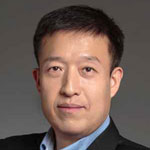 |  |  |
Dahai Ren is an associate professor of Tsinghua University, China. His research interests include BioMEMS/BioNEMS, biomolecular detection, and nano sensors/transducers.
Prof. Ren has been the principal investigator of many national projects. The accomplished and ongoing studies include single cells patterning and detection methods, nano intracellular probes for the multiplexed detection of living cells, high-throughput single-cell gene sequencing, high precision miniature magnetometer, thermoelectric transducer, etc.
Professor Ren is the member of the Academic Committee of Chinese Society for Optical Engineering, the member of the Professional Committee of the Photoelectric Technology, and the member of the council of Internet of things of China Instrumentation Society. He is the vice director of the Beijing Laboratory of Biomedical Detection Technology.
Prof. Ren is a recipient of many awards including the Prize for Advancement in National Science & Technology of China, the Prize for Advancement in Science & Technology (Mechanical Science and Technology, China), the Prize for Advancement in Science & Technology (National Education Ministry, China), the Prize of Invention in Science & Technology (Beijing, China) and the Prize for Advancement in Science & Technology (Beijing, China). In 2016, he was nominated for the Young Scientist Awards (Sponsored by OSA) and the Innovation Awards (Sponsored by Lab on a Chip, RSC).
In 2013, Prof. Ren participated in founding Beijing Laboratory of Biomedical Detection Technology and Instrument. In 2013, he participated in founding the National Translational Medicine Centre for Age-related Diseases. Also he has wide international collaborations with many famous universities and research institutes including MIT, CIT, UC-Berkeley, UCLA, Seoul University, RIKRN, etc.
Prof. Ren serves on the Editorial Board of 2 international academic journals. He has been the invited speaker of more than 10 academic conferences during the past 3 years. Prof. Ren has published more than 100 peer-reviewed papers on academic journals and conferences in recent years. Also he has more than 10 National Invention Patents authorized. In 2017, an academic monograph he co-authored won the China Government Prize for the Publications, the highest award for Chinese publications.
|

